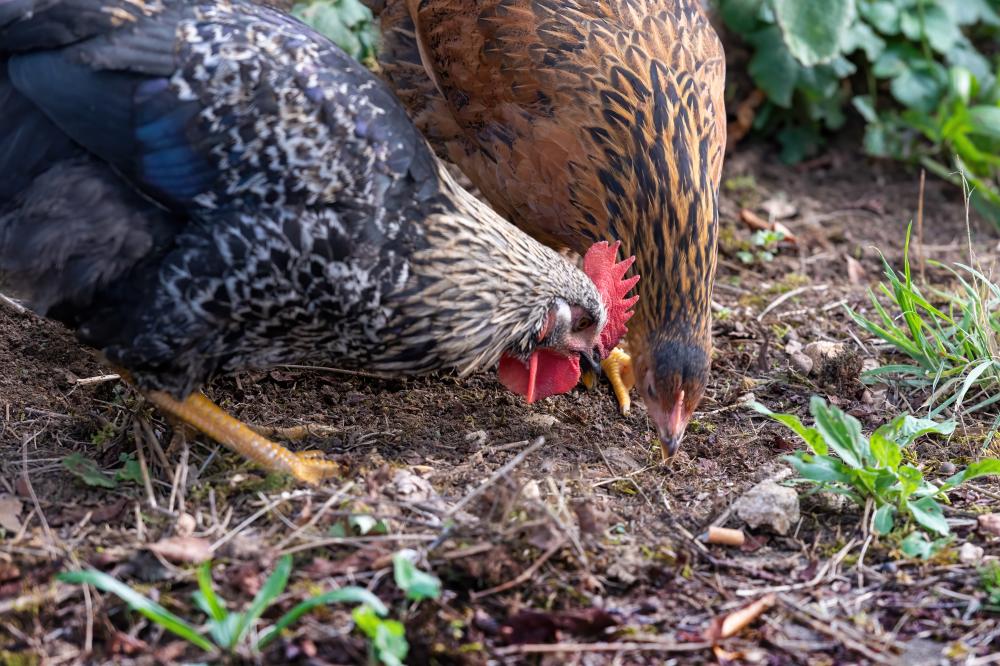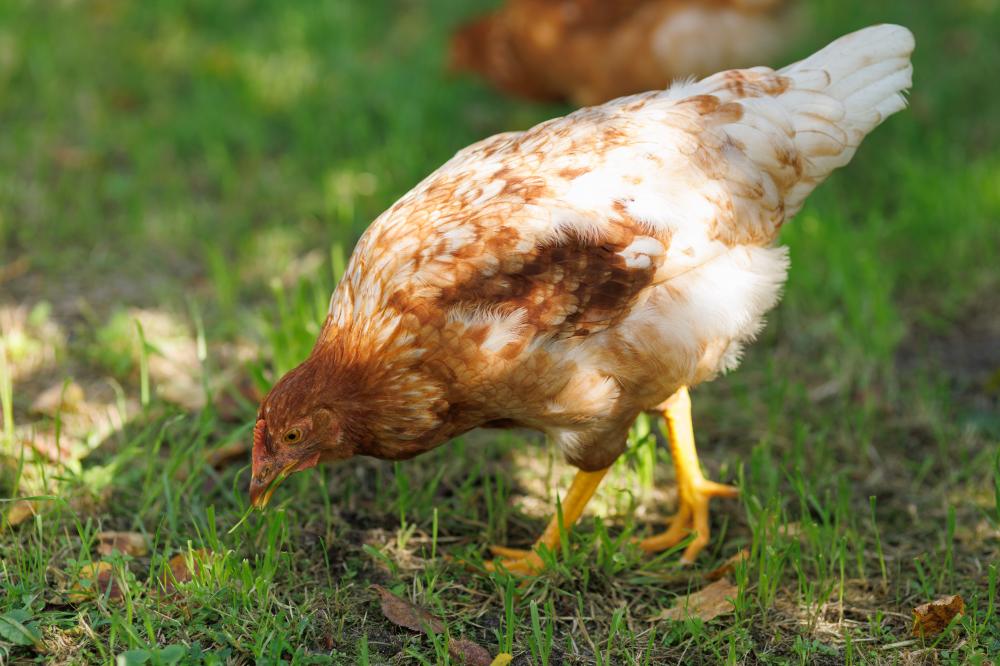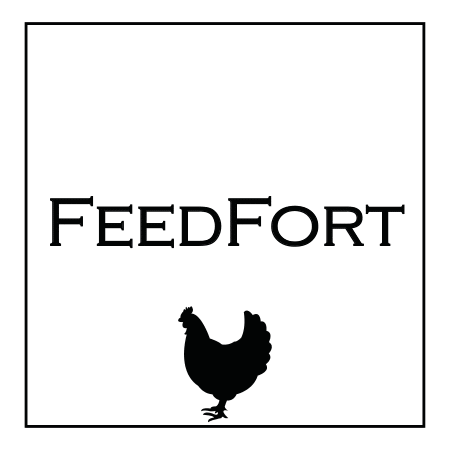Efficient Chicken Feeding

Efficient Chicken Feeding
At FeedFort, we understand the pivotal role that efficient chicken feeding plays in the health and productivity of your flock. Drawing from our expertise in developing groundbreaking chicken feed solutions, we’re here to share insights into making your chicken feeding process as efficient and effective as possible.
Understanding Your Flock’s Needs
Every flock is unique, and recognizing the specific needs of your chickens is the first step towards efficient feeding. Factors such as age, breed, and whether they’re laying or meat birds, all influence their dietary requirements. Our approach at FeedFort prioritizes the well-being of your chickens, ensuring they receive the right nutrients at the right time.
The Role of Technology in Feeding
Technological advancements have transformed the way we feed our chickens. The FeedFort automatic chicken feeder, equipped with photocell technology, adjusts its opening and closing based on daylight, ensuring feed is only available when your chickens are active, reducing waste and deterring pests.
Keeping Pests at Bay
One of the challenges in efficient chicken feeding is preventing feed from becoming a free buffet for rodents and other pests. Our patented feeder design is a testament to our commitment to keeping your feed secure from unwelcome guests, which in turn helps maintain your flock’s health by reducing the risk of disease transmission.
Feeding Strategies
Adopting the right feeding strategy can significantly impact your flock’s efficiency in consuming feed. Whether you’re offering feed free-choice or on a schedule, consistency is key. Integrating an automated feeder can streamline this process, ensuring that feed is always available when your chickens need it, without overfilling and wasting valuable feed.
Feed Types and Nutrition
- Starter Feed for Chicks: High in protein to support rapid growth.
- Grower Feed: Bridges the gap between starter and layer feed, supporting continued growth.
- Layer Feed: Lower in protein but enriched with calcium, to support eggshell production.
- Feed Supplements: Occasionally necessary to address specific nutritional gaps.
Minimizing Feed Waste
Feed efficiency isn’t just about what you feed, but also how much of it is actually consumed by your flock versus what is wasted. The slow descent feature of our FeedFort feeder minimizes spillage, ensuring your chickens get the most out of their feed, and you get the most out of your investment.
Health and Productivity
Efficient chicken feeding goes beyond just providing food; it’s about fostering an environment where your chickens can thrive. A balanced diet leads to a healthy flock, and a healthy flock is a productive one. Keep an eye out for signs of nutritional deficiencies or excesses, as both can impact your chickens’ health and productivity.
Integrating Flocks with Different Feeds
Introducing new birds to an existing flock or managing birds at different life stages can present a challenge in maintaining efficient feeding practices. Separation and gradual introduction of new feeds can ease this transition, ensuring all chickens have access to the appropriate nutrients without disrupting the feeding regimen of your entire flock.
Personal Experience and Anecdotal Evidence
Over the years, we’ve received countless stories from customers who have seen remarkable improvements in their flock’s health and egg production after switching to our FeedFort feeder. These personal testimonials underscore the importance of efficient chicken feeding and the role that innovative technology can play in achieving it.
In conclusion, efficient chicken feeding is a multifaceted process that requires attention to detail, understanding of your flock’s needs, and the right tools for the job. At FeedFort, we’re proud to offer solutions that help chicken owners worldwide achieve just that. Embrace technology, prioritize your flock’s health, and watch as the benefits of efficient feeding manifest in your chickens’ wellbeing and productivity.

What is the most cost effective way to feed chickens?
When it comes to feeding chickens efficiently and cost-effectively, the key is balancing high-quality feed with diligent management practices. One approach we’ve championed at FeedFort is encouraging a diet that consists of a combination of formulated feed and controlled access to natural foraging. This not only meets the nutritional needs of the chickens but also reduces the quantity of purchased feed required.
Moreover, implementing our patent-pending automatic feeder helps minimize waste by ensuring feed is dispensed in a controlled manner, accessible only when chickens are active. This method significantly cuts down on feed costs over time by reducing overfeeding and preventing pests, which can deplete feed supplies and lead to additional expenses.
Have you considered how much feed your chickens might be wasting due to over-access or pest interference?
What is the best feeding method for chickens?
The best feeding method for chickens balances between ensuring they have continuous access to food, minimizing waste, and meeting their specific nutritional requirements. At FeedFort, we advocate for the use of automated feeders for several reasons. Firstly, they provide feed on a schedule aligned with the chickens’ natural feeding behaviors, reducing waste and encouraging healthy eating habits.
Secondly, by adjusting the amount of feed based on your flock’s size and age, you can ensure that each bird receives the proper nutrition without overfeeding. This method supports optimal health and productivity among the flock. Additionally, automated feeders, like the one we’ve developed, prevent pests, safeguarding your feed supply and your birds’ well-being.
Do you currently have a system in place that meets all your flock’s nutritional needs while also being efficient?
What is the most feed efficient chicken?
In selecting breeds for feed efficiency, it’s important to consider the purpose of your flock. For egg production, Leghorns are renowned for their feed-to-egg conversion rate, making them an economical choice. On the other hand, broiler breeds like the Cornish Cross are optimized for meat production, exhibiting rapid growth rates and efficient feed conversion, albeit with higher overall feed consumption.
At FeedFort, our focus extends beyond just the breed. We emphasize the importance of a tailored feeding program that enhances the natural feed efficiency of these breeds. Our feeder technology plays a crucial role in this, ensuring that feed is delivered in a way that matches the birds’ feeding patterns and reduces waste.
Considering your current flock, have you evaluated the feed efficiency of different breeds to find the best fit for your objectives?
How long will a 50 pound bag of feed last 4 chickens?
On average, a chicken consumes about 0.25 pounds of feed per day. Therefore, for four chickens, you’re looking at about 1 pound of feed daily. This means a 50-pound bag should last you roughly 50 days. However, this can vary based on factors like breed, age, and the chickens’ environment. Chickens in colder climates, for example, may consume more feed to maintain their body temperature.
Our FeedFort feeder aids in making this estimation more accurate by ensuring that every grain of feed is utilized efficiently, cutting down on waste and potentially extending the duration your feed supply lasts. This can make budgeting and planning feed purchases much easier and more predictable for chicken owners.
Have you noticed a difference in your feed consumption when using controlled feeding methods like our automatic feeder?
How can I recognize nutritional deficiencies in my flock?
Recognizing nutritional deficiencies in your flock is crucial for maintaining their health and productivity. Signs to watch for include poor growth rates, decreased egg production, abnormal feathering, and general lethargy. Vitamin and mineral deficiencies can manifest in more specific signs, such as soft-shelled eggs indicating a lack of calcium.
At FeedFort, we recommend frequent observation of your flock and the implementation of a balanced diet using high-quality feed. Our feeder ensures that feed is distributed evenly and according to the flock’s needs, which helps prevent nutritional imbalances. Additionally, it’s worth consulting a poultry nutritionist or veterinarian if you suspect your chickens are not receiving the nutrients they need. They can offer guidance customized to your flock’s specific circumstances.
When was the last time you assessed your chickens’ diet for potential nutritional gaps?
Chicken Feeding Resources
- USDA – Animals: The United States Department of Agriculture provides valuable information on animal care and nutrition, including resources specific to poultry and chicken feeding.
- University of Minnesota Extension – Poultry Nutrition and Feeding: The University of Minnesota Extension offers research-based information on poultry nutrition and feeding practices to help you optimize your flock’s health and productivity.
- eXtension – Poultry Feed, Nutrition, and Water: eXtension provides a comprehensive collection of resources on poultry feed, nutrition, and water management to assist poultry producers in making informed decisions for their flocks.
- eXtension – Nutrient Requirements of Poultry: Learn about the specific nutrient requirements of poultry at different life stages and how to formulate balanced diets to meet those needs effectively.
- National Agricultural Library – Feed and Feeding of Poultry: Access resources from the National Agricultural Library to improve your understanding of feed ingredients, formulation, and feeding strategies for poultry.

